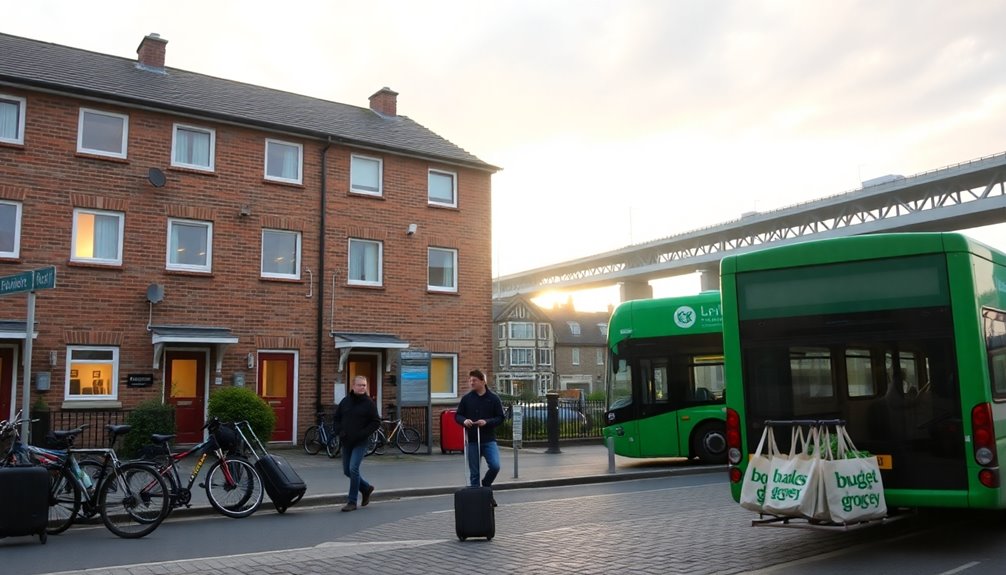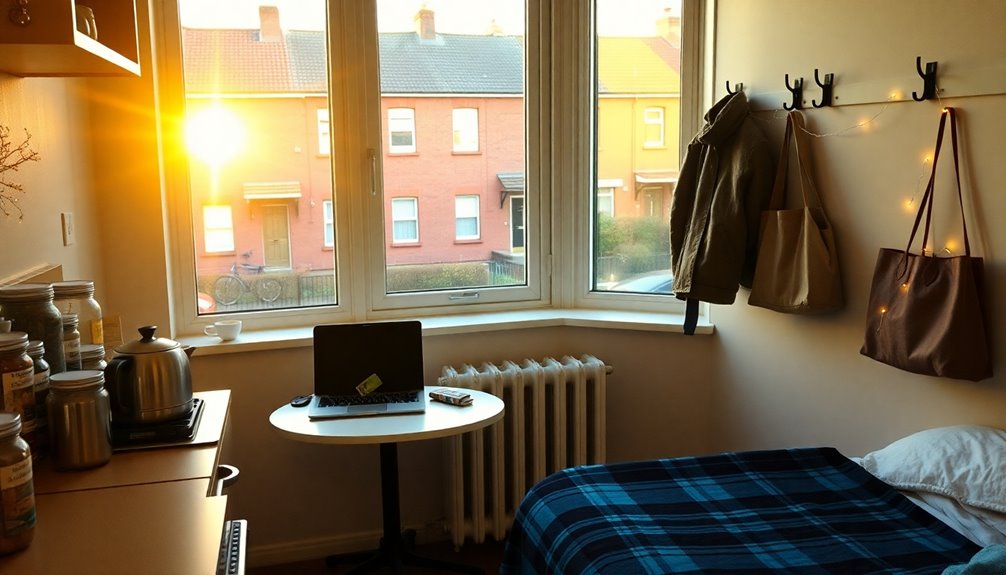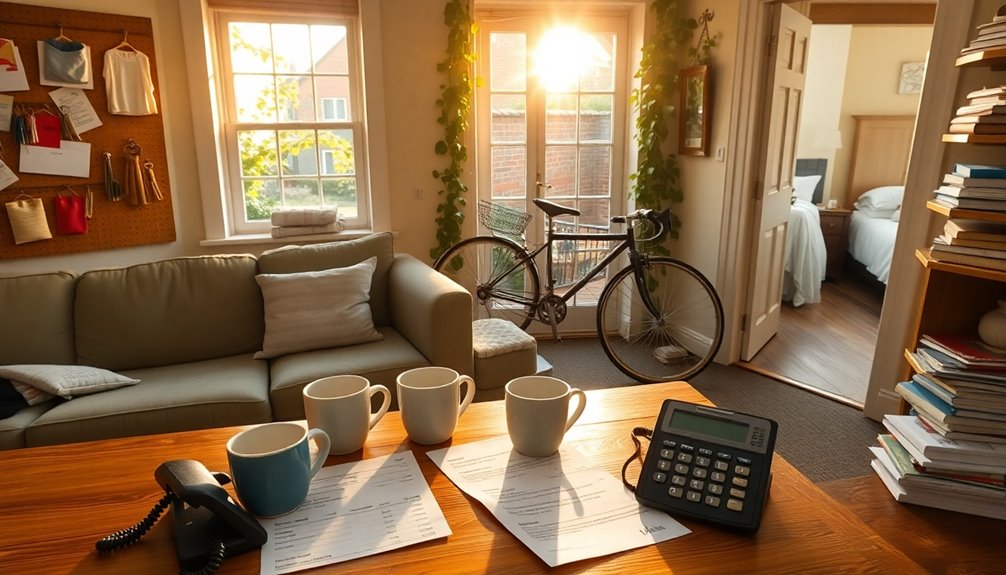
You’ll find affordable residences in Limerick by focusing on Dooradoyle and Castletroy, where shared flats often cost €350–€600 and studios are slightly higher. Look for short-term private lets and student halls near campus to balance rent, bills and commute. Expect utilities and internet of about €80–€150 monthly, and groceries around €150–€300 if you cook. Prioritise clear housemate agreements and a small emergency fund, and keep exploring options for more tips.
Rent Ranges by Neighbourhood in Limerick
While prices vary, you’ll usually find the most affordable student rentals in suburbs like Dooradoyle and Castletroy where one-bed and shared flats often range from €350–€600 per month per person; closer to the city centre and near the university, expect rents to rise to roughly €450–€800 for similar accommodations. You’ll want to map Limerick neighborhoods by transit links, safety, and nightlife so you can balance freedom with convenience. Prioritize areas where you can walk or cycle to classes, cafés, and parks to keep costs down and choices open. Compare weekly commute time against monthly rent prices to decide what freedom is worth. Keep an eye on local listings and act fast when a good, well-located flat appears.
Shared Housing vs. Studio Costs
You’ll want to compare the monthly costs of shared housing—where you split rent and bills—with those of a private studio. Shared options usually lower your base rent but can add variability from utility and communal expenses. We’ll weigh those typical trade-offs so you can pick what fits your budget.
Shared Housing Expenses
Although living with roommates means you’ll trade privacy for lower rent, shared housing often cuts monthly housing costs dramatically compared with renting a studio. You’ll split utilities, broadband and groceries, so your individual outlay drops and you keep more freedom to spend on experiences. Clear housing agreements matter—set who pays what, when, and how bills are divided to avoid tension. Use apps or a simple ledger to track shared expenses and due dates, and agree on cleaning, guests and quiet hours so independence doesn’t become chaos. If you value flexibility, choose short-term leases or sublets that let you move easily. With good communication and written rules, shared living gives you budget breathing room and social perks without losing autonomy.
Studio Rent Comparison
When deciding between a shared apartment and a private studio, think about more than just the monthly rent: studios usually cost more upfront but give you full control over your space, whereas shared housing splits base rent and recurring bills so your out‑of‑pocket is lower. You’ll weigh freedom against savings: a studio lets you set your own routine, control noise, and personalize décor, while shared housing can free cash for experiences or travel. Check studio features like in‑unit kitchen, private bathroom, and storage to see if the premium’s worth it. Don’t ignore location benefits — shorter commutes and nearby cafés can boost your independence. Ultimately choose what gives you mobility, privacy, and the budget to enjoy student life.
Utility and Internet Expense Estimates
Utility and internet bills can add a predictable chunk to your monthly budget, so it helps to know typical costs before signing a lease. You’ll want to factor in utility cost for heating, electricity and water — expect variability by season and flat type. For internet plans, basic packages suit light browsing while faster fibre options support streaming and group study sessions; check for student discounts and contract length.
- Heating/electricity: estimate €60–€120/month depending on usage and insulation.
- Water/garbage: often €10–€30/month or included by landlord.
- Internet plans: €25–€45/month for reliable home broadband; higher for premium fibre.
Plan flexibly so bills don’t clip your independence.
Average Grocery and Food Budget
Since food habits and cooking facilities vary, expect to spend about €150–€300/month on groceries as a single student — less if you cook most meals and buy staples in bulk, more if you eat out often or prefer specialty items. You can keep costs down while enjoying freedom: pick a small flat with a usable kitchenette, shop seasonal produce, and compare prices at local markets and discount supermarkets. Good grocery shopping habits and basic meal planning let you stretch your budget without sacrificing choice. Batch-cook soups, pasta and rice dishes, freeze portions, and rotate staples like eggs, oats and legumes. Treat occasional social meals as part of your lifestyle, not your baseline, and you’ll balance savings with flexibility.
Transportation and Travel Savings

One smart way to cut costs is to choose transport that fits your routine: cycling, walking, and monthly transit passes usually beat frequent taxi rides or occasional car rentals. You’ll gain freedom and save if you mix public transport with biking options and walking routes, using travel apps to plan faster trips. Look for student discounts on travel passes and sign up for alerts from ride sharing services to snag shared fares instead of taxis. Keep choices flexible so you’re not tied to expensive options.
Choose transport that fits your routine—walk, bike, and use monthly passes or shared rides to save money.
- Learn local walking routes to replace short rides.
- Use travel passes and student discounts for regular commutes.
- Combine biking options with public transport and ride sharing services.
Affordable Short-Term Stay Options
Saving on travel often frees up budget for your living arrangements, so it’s worth looking at short-term housing that won’t sap your funds while you settle in. You can choose short term rentals like private rooms, studio flats, or flexible Airbnb stays that let you test neighbourhoods before committing. Pick places near transport links so you keep mobility without extra cost. Look for hostels with long-stay deals or guesthouses offering weekly rates; these budget friendly options often include utilities and Wi‑Fi, cutting hidden expenses. Negotiate directly with landlords for discounted monthly rates if you plan to extend. Keep a checklist for safety, cancellation policy, and proximity to your English school so you maintain freedom to move when better deals or permanent housing appear.
Student Accommodation Discounts and Eligibility
When you’re hunting for student housing, discounts and eligibility rules can make a big difference to your budget and options. You’ll want to check who qualifies for student discounts and what eligibility criteria each residency requires — from full-time enrolment to proof of study or age limits. Knowing the rules lets you pick housing that matches your desire for independence without hidden barriers.
- Look for university-affiliated halls offering priority or reduced rates with clear eligibility criteria.
- Seek private landlords who accept student IDs or offer semester-based student discounts.
- Explore local schemes for under-25s or low-income students that require simple documentation.
Be proactive, keep records handy, and choose flexible options that respect your freedom and lifestyle.
Budgeting Tips for Term-Time and Holidays

If you plan ahead for term-time and holidays, you’ll avoid last-minute expenses and make the most of limited funds: set separate budgets for rent/utilities, food, transport and social costs, then track spending weekly so you can adjust before debts pile up. You’ll want clear budgeting strategies that match your lifestyle — decide fixed versus flexible expenses, automate transfers for rent and an emergency pot, and use apps to visualise cash flow. For holidays, create a dedicated holiday savings jar or account, estimate trip costs early, and book transport or short-term stays in advance to lock discounts. Prioritise experiences that fit your budget, swap costly nights out for free local events, and review subscriptions regularly so you keep freedom without financial strain.
Cost-Effective Study Spaces and Libraries
Because good study spaces do more than just house your books, choosing cost-effective spots can boost focus and reduce expenses — look beyond your room to libraries, campus common areas, and community centres that offer quiet zones, free Wi‑Fi, and long opening hours. You’ll find study space options that suit your rhythm: silent reading rooms, group tables, or flexible lounge areas where you can work and recharge. Use library resources like interlibrary loans, study carrels, and online journals to save on textbooks and research costs. Pick spots that let you move freely between focused work and breaks, so you stay productive without feeling trapped.
- Silent study rooms for deep focus
- Shared tables for collaborative practice
- Community centres with extended hours
Comparing Private Providers and Student Halls
While both private providers and university halls aim to house students affordably, they differ in cost, contract flexibility, and community feel. You’ll find private accommodation advantages like shorter leases, more privacy, and the freedom to choose location or roommates, often at slightly higher rent but with control over your schedule. Student hall amenities usually include utilities, cleaning, and social events, which suit you if you want built‑in community and predictable monthly costs. Decide whether you value autonomy or convenience: private lets you personalize living space and lifestyle; halls simplify logistics and foster instant connections. Compare total monthly costs, deposit rules, visitor policies, and noise levels before signing so you keep freedom without unexpected constraints.
How to Find Housemates and Split Bills

When you’re hunting for housemates, start by listing what matters most — budgets, schedules, cleanliness standards, and social habits — so you can match with people whose expectations line up with yours. Be proactive about finding flatmates: post clear ads on student groups, attend flatshares viewings, and meet people in cafes or language classes so you get a feel for their lifestyle. Agree upfront on splitting bills fairly and on methods — apps, spreadsheets, or a single payer — to keep freedom and trust intact. Put agreements in writing to avoid friction, and rotate chores to keep shared spaces pleasant.
- Set a monthly payment date and preferred payment method
- Define cleaning rota and guest rules
- List utilities included and how to track usage
Emergency Funds and Unexpected Expense Planning
Shared bills and chore schedules keep daily life predictable, but unexpected costs — like a broken boiler, urgent visa fee, or sudden travel home — can still upset your budget. You’ll want a simple plan: build emergency savings equal to a few weeks’ rent, agree with housemates on a small shared contingency pot, and insure high-risk items. Keep access flexible so you can move freely without financial ties.
| Item | Action |
|---|---|
| Emergency savings | Save 2–4 weeks’ expenses |
| Contingency pot | Small shared fund |
| Insurance | Cover valuables/health |
| Priorities | Rent, travel, visa fees |
| Review | Quarterly check-in |
Treat this as freedom insurance: clear rules, joint responsibility, no drama when unexpected costs arrive.
Some Questions Answered
Are There Quiet Evening Curfew Rules in Student Residences?
Yes — you’ll usually have quiet hours; they’re enforced like prison rules sometimes, but they’re just student policies to keep study peace. You’ll still have freedom outside those hours and can relax with friends later.
Can International Students Receive Accommodation Guarantor Assistance?
Yes — you can get help; many universities and private landlords offer international student options and accommodation support, and you’ll often find guarantor schemes, university-backed guarantees, or third-party services if you don’t have a local guarantor.
Is Short-Term Summer Storage Available for Belongings?
Yes — you’ll find short term storage like a harbor for student belongings, letting you set sail freely between terms. You’ll be able to reserve space, access items flexibly, and avoid lugging things home.
Are Pets or Emotional Support Animals Permitted?
Yes — you can keep pets in designated units, but pet policies vary, so check rules and fees first. Emotional support animals are usually accommodated with documentation; you’ll still need to follow care, noise, and cleanliness guidelines.
What Paperwork Is Needed to Secure a Tenancy Contract?
You’ll need a signed tenancy agreement plus required documentation: photo ID, proof of address, employment or student enrollment letters, references, and sometimes a deposit receipt or guarantor form; keep copies so you’re free to move confidently.
